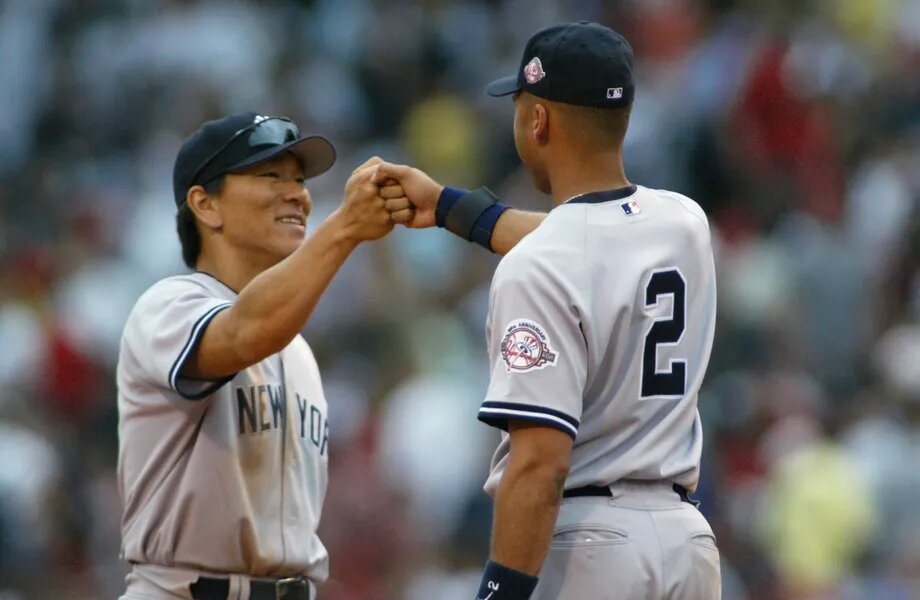It was 2002. The Yankees had won 103 games in the regular season and were trying to break their own record of five consecutive World Series appearances after winning it all from 1998 to 2000 and falling in Game 7 of the 2001 Fall Classic to the Arizona Diamondbacks. The Bombers then lost in four games to the surprising Anaheim Angels in the AL Division Series.

All New York could do was wait until the offseason to make amends. After reaching the year’s final series four times in a row, a first-round departure felt like a letdown, so owner George Steinbrenner wanted to make a statement. In true Yankees tradition, the Boss struck gold and signed Japan’s biggest star at the deadline.
At the time, Yankees fans were well aware of who he was. I recall being a 14-year-old fan eager to know and study about the Yankees’ every move, as well as investigating this fearsome, imposing lefty batter nicknamed “Godzilla.” That year, he hit.334 with 50 home runs for the Yomiuri Giants of the Central League, receiving MVP honors. He stole 346 bases in 140 games and had a 1.153 OPS, his fourth consecutive season with an OPS above 1.000. Matsui was a true monster, deserving of his moniker, and other clubs coveted him as one would anticipate.
However, the Yankees came out on top. That in itself felt like a moral win. Matsui was signed by the Yankees twenty-one years ago today to boost their outfield and lineup. After all, Rondell White and Ral Mondes weren’t exactly world-beaters in the corners the previous season.
Just two years previously, another Japanese batter, Ichiro Suzuki, demonstrated that skilled NPB position players could easily transfer to MLB competition. With the Seattle Mariners, the former Orix Blue Wave threat promptly won AL Rookie of the Year and MVP accolades. In 2003, the New York front staff believed Matsui might have a similarly smooth transition, and they were proven correct.
The 50-homer power never really translated to the big leagues, but that’s fine: Matsui had a 109 OPS+ and hit.287/.353/.435 with 16 home runs, 42 doubles, 82 runs, and 106 RBI. He hit a grand slam in his Bronx debut that April, and by July, he was an All-Star in his rookie season.
The Yankees would storm back to the World Series with the sturdy Matsui locking down left field for a team-record 163 games (due to a tie).
Matsui was no hitless bystander during that year’s postseason run. In 17 games, Godzilla hit two home runs, four doubles, and drove in 11 runs. One of those two-baggers was particularly significant, coming off Boston’s Pedro Martinez in the eighth inning of Game 7.
The Yankees defeated the Red Sox thanks to these heroics, as well as Aaron Boone’s, but the Marlins defeated them in the World Series. Despite Matsui’s home run in Game 2 and the game-winning hit late in Game 3, the series was a shambles.
Matsui would finish second in the AL Rookie of the Year voting, but he was widely regarded as the worthy winner. Given his 10-year sojourn in Japan, some voters determined he wasn’t a “rookie” — despite the fact that Ichiro, Hideo Nomo, and Kazuhiro Sasaki had earned Rookie of the Year awards under similar conditions. Two BBWAA writers did not vote for Matsui at all, and Kansas City’s ngel Berroa won the award by a mere four votes.
Matsui would go on to have a career year the next year, with a.912 OPS (137 OPS+), 31 homers, 108 RBI, 109 runs scored, and 34 doubles. The lefty masher drove in 330 runs in his first three seasons in MLB. Matsui played seven years in the Bronx and did more than his fair share to earn a position on our list of the Top 100 Yankees.
Those days in late 2002, on the other hand, were full of hope. Only one offseason after splurging the cash on Jason Giambi, the Yankees did it again and landed one of the best and most prolific sluggers the NPB has ever produced.
Even though the Yankees wouldn’t win another World Series until 2009, thanks in large part to Matsui’s performances in his final season in the Bronx, Godzilla was always a terrifying presence in the box. He frightened pitchers with his incredible combination of power and contact, striking out in only 13.6 percent of his career plate appearances.That was back in the day.




